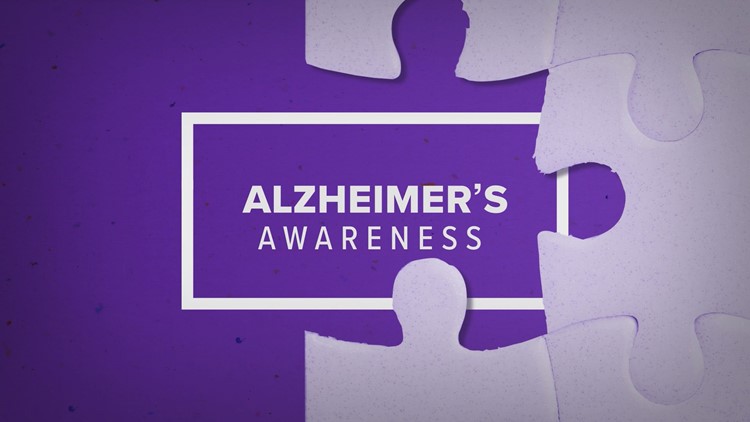KUSA — 9NEWS is putting the spotlight on Alzheimer’s Disease ahead of the 2019 Walk to End Alzheimer's, which is slated for Saturday, Sept. 14.
You can find more information about the event by clicking or tapping here.
We’re sharing stories of people dealing with the disease, caregivers, research and resources.
Alzheimer’s is a progressive disease where dementia symptoms worsen over the years. Every day can bring its own unique challenges.
According to the Alzheimer’s Association, 5.7 million people are living with the disease, and by 2050, that number is projected to rise to nearly 14 million.
STORY | Changing the narrative on aging
In our state, 71,000 Coloradans are living with Alzheimer’s, and that number doesn’t even include people dealing with other diseases that come with similar symptoms of memory loss and personality changes.
MORE COVERAGE | Remembering Pat Bowlen
GETTING HELP
For families dealing with the devastating diagnosis, sometimes the hardest part is picking up the phone and asking for help.
Cara Oberheide, with the Alzheimer’s Association in Colorado, said sometimes, it’s guilt.
“You have those barriers based on someone’s long-term love and their marriage, and they don’t want to give up, so to speak,” Oberheide said.
She said it’s hard for some people to admit they need help, but it’s important for caregivers to take care of themselves too.
The Alzheimer’s Association has a helpline for caregivers, families and people who are diagnosed with the disease. It can be reached for free 24/7 at 1-800-272-3900.
The helpline can assist with the following:
- Helping people understand that dementia is a disease and memory loss that disrupts daily life is not part of normal aging
- Helping families cope more effectively with changes in behavior and personality they will see in their loved one (that they might otherwise attribute to the person being disagreeable, suffering from depression or another malady)
- The benefit to the person of being able to take advantage of medications available that have proven to be most effective in the early stages of the disease
- Ensuring that the safety of the person with the disease
- Anticipating the adjustments that will be required, both in terms of providing physical care as well as legal and financial planning
- And helping the caregivers understand the challenges they will be facing and the resources available to help them (including classes, support groups, the 24/7 Helpline)
RURAL COMMUNITIES
Alzheimer’s disease can already feel isolating for those affected by it; add in a rural setting, and it can be even more daunting to find information or care.
Salud Family Health Centers are based in communities across Colorado. They help patients from every type of background, even if they don’t have insurance.
Dr. Tillman Farley, chief medical officer at Salud Family Health, said it’s the family who typically recognizes changes in their loved ones.
“There are things that can be done to help with Alzheimer’s, and even more importantly, there are other causes of dementia that we can actually do something about, and then there are services that we can provide for the family so they can cope better with their family that has this problem, “ Farley said.
It's hard to change the course of Alzheimer's. Healthcare providers say it can be frustrating to have a disease you can’t get rid of or fix entirely, but there are still ways to help people.
“When there is something that you can offer like help for the family, it makes you feel good because there’s something now that we can do about it, at least in some small way,” Farley said.
Salud works closely with the Alzheimer’s Association to help people find the resources they need when dealing with the disease.
MINORITY GROUPS
According to the Alzheimer’s Association, 47 million people worldwide are dealing with the disease. That means someone new develops dementia every 3 seconds.
Alzheimer’s disproportionately affects minority communities.
According to the Alzheimer’s Prevention Initiative, African Americans are two to three times more likely to develop the disease than white Americans.
RESEARCH
Despite the fact that Alzheimer's research continues to be a graveyard for a large number of drugs formulated to cure it, researchers now generally agree that they are finally getting closer to a solution.
There are currently three drugs in trials that are showing great promise.
9NEWS has done a lot of reporting about two of these drugs, Adacanumab and Leukine, both in various stages of research at the CU Anschutz Medical Center. Both so far are showing generally positive results.
The third and newest drug still doesn't have a name, it has a designation.
"BAN2401" comes from drug maker Biogen's Japanese partner Eisai.
RESOURCES
The Alzheimer's Association of Colorado 24/7 helpline is 1-800-272-3900
Alzheimer's: 9NEWS coverage in one place | Collection of stories from June 2018



